share on
With the COVID-19 outbreak bringing about unprecedented times, companies worldwide have taken steps to reevaluate their practices and do what’s best to sustain amid tough times.
For instance, some companies are implementing hiring freezes, wage freezes and promotion freezes, while others are introducing remote working alternatives and additional financial assistance.
In line with this, Aon’s latest APAC Pulse Survey – Navigating the impact of COVID-19 on workplace and rewards practices takes a further look at the workplace, HR and compensation policies being implemented by 304 companies in the region.
Respondents included companies from Southeast Asian countries – Malaysia, Singapore, Indonesia, Thailand, the Philippines, and Vietnam, as well as Greater China, Japan & Korea region, and the Pacific Region.
85.5% of firms are proceeding with planned pay increases and bonuses
While companies are cautious of their compensation plans today, close to nine in 10 of those surveyed have indicated that they will continue with their planned salary increases and bonus payouts, a popular option in Southeast Asia (85.7%) and the Japan & Korea region (90.6%).
That said, some companies are also taking measures to freeze salaries (4.9%), and adjust their incentive plans, i.e. targets and payouts (4.6%). This was largely seen among Pacific countries, where about 10% were actively considering salary freezes and bonus reductions.
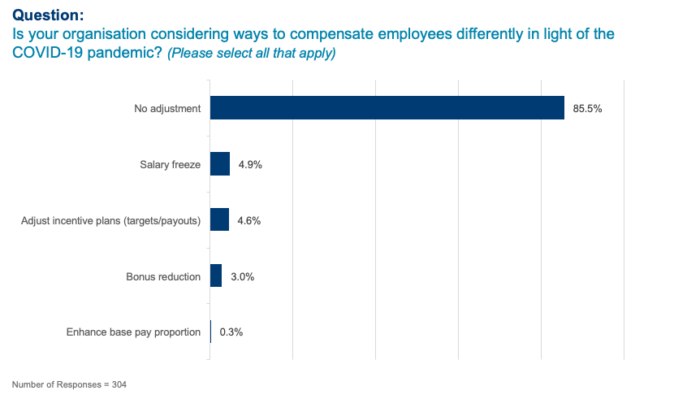
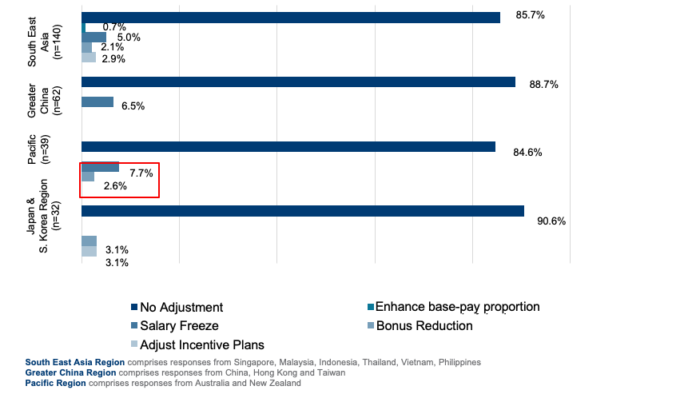
When further broken down into industry-specific insights, the following chart illustrates that even across industries, a large majority will see no adjustments to pay. However, the healthcare sector, retail & wholesale trade, and professional services sector have still reported salary freezes and muted bonus payouts.
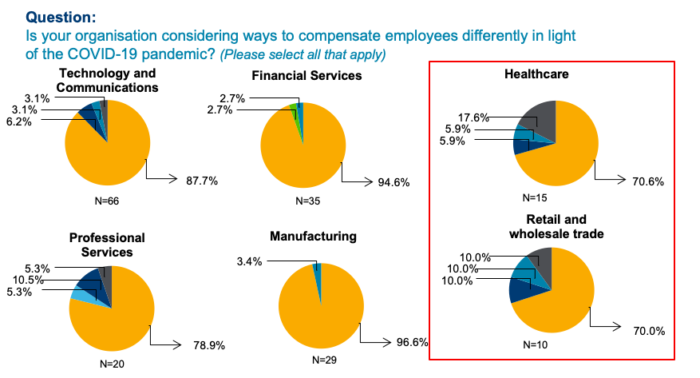
Close to three in 10 firms are adopting a cautious approach to hiring
While the above is in place, close to 45% of respondents have said they are ‘closely reviewing’ their workforce plans, with 29% adopting a cautious approach to hiring. Of the remaining, 11% are implementing a hiring freeze, while a lesser 5% see a potential downsizing.
On the contrary, 55% of respondents do not see any impact on their workforce plans.
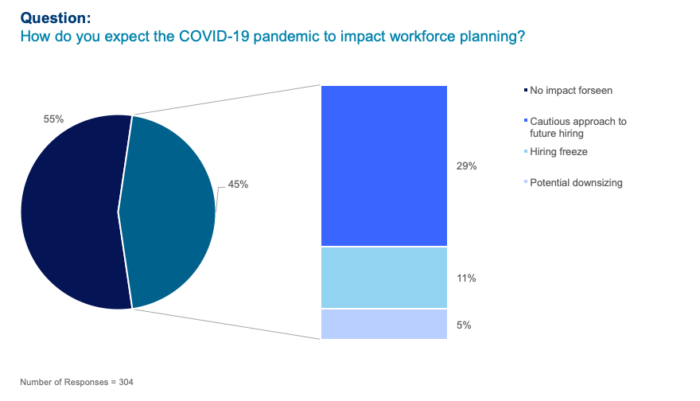
By sector, the hospitality and healthcare sectors are expected to see a hiring freeze (28.6% and 10% respectively) and potential downsizing (57.1% and 10% respectively) in the coming months.
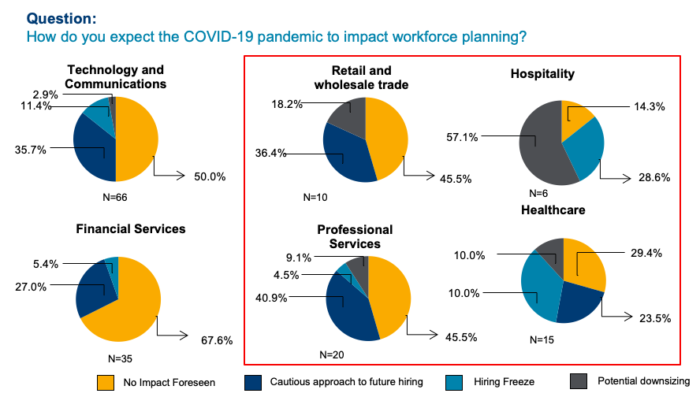
Top welfare measures adopted: Protective equipment, family care support, and employee assistance programmes
In terms of employee welfare, respondents were given a list of welfare measures, and asked to select those that they’ve adopted in thier organisation, in light of the COVID-19 pandemic.
To this, a majority (70.4%) said they had provided employees with protective equipment such as masks and googles, while a second majority (45.4%) provided family care support.
Third came employee assistance programmes (EAPs), with close to four in 10 (39.5%) of companies having implemented them; on the other hand, additional financial allowance, as well as catered meals (which would reduce the frequency of employees visiting crowded places), were the two least popular measures undertaken, with just 4.9% and 6.6% implementing them respectively.
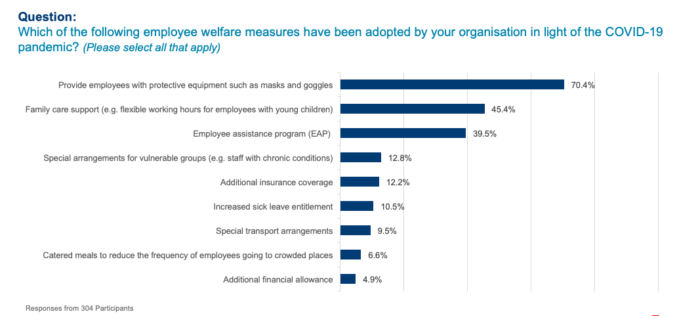
What stood out was that while EAPs were proactively implemented in the Pacific region (59%), as well as special arrangements such as flexibility for vulnerable groups (18%), measures such as providing additional insurance coverage for employees have less prevalence than other APAC regions (2.6% vs APAC 12.2%).

Is HR prepared?
Undoubtedly, HR professionals have a huge role to play in managing the workforce and implementing contingency plans during such times of crisis, in order to minimise any disruption to normal operations.
In light of COVID-19, HR departments were asked about the main challenges they faced – and a majority across APAC indicated the management of crisis responses, and business continuity plans (67%).
A close majority also indicated the challenge of managing flexible work arrangements (63.5%), while over five in 10 (55.6%) indicated increasing awareness in employees.
While this was so, a lesser few (13.2%) indicated the challenge of having inadequate medical insurance coverage for employees.
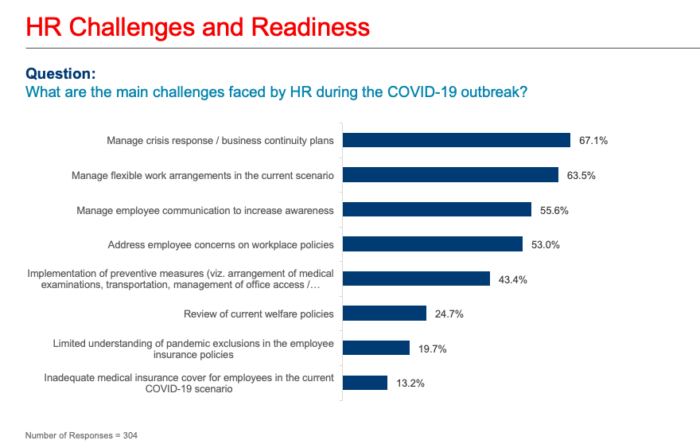
One key point that stood out was – when asked if their HR department was adequately trained, equipped and ready to deal with challenges posed by the outbreak, one a scale of 1-5, most companies rated 3 (42.3%). At the same time, close to three in 10 (27.6%) rated 4.
Among the top five industries with the most respondents for the survey, respondents in financial services (19%) were the most likely to believe that their HR departments were sufficiently ready (rating 5) to deal with COVID-19.
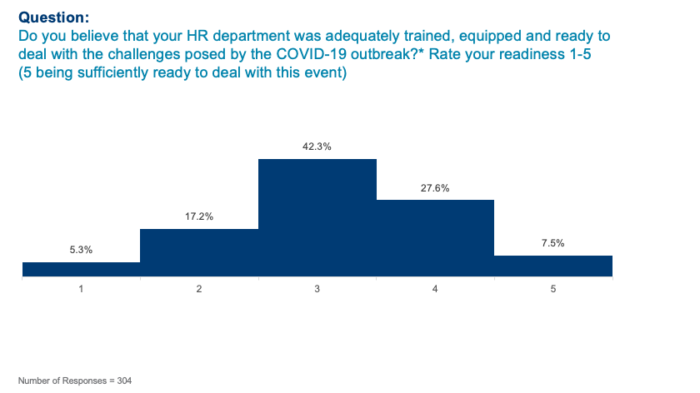
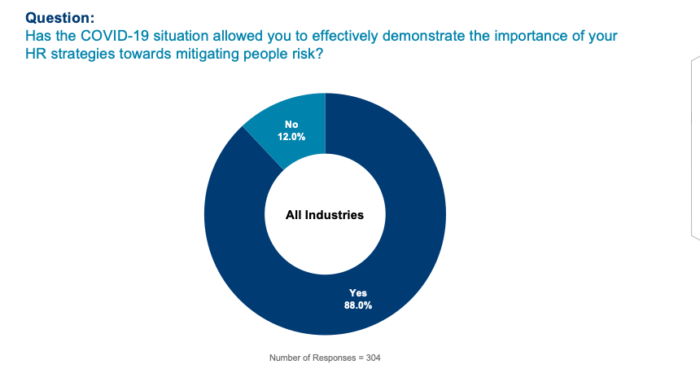
Lead image and infographics / Provided
share on
Follow us on Telegram and on Instagram @humanresourcesonline for all the latest HR and manpower news from around the region!
Related topics


